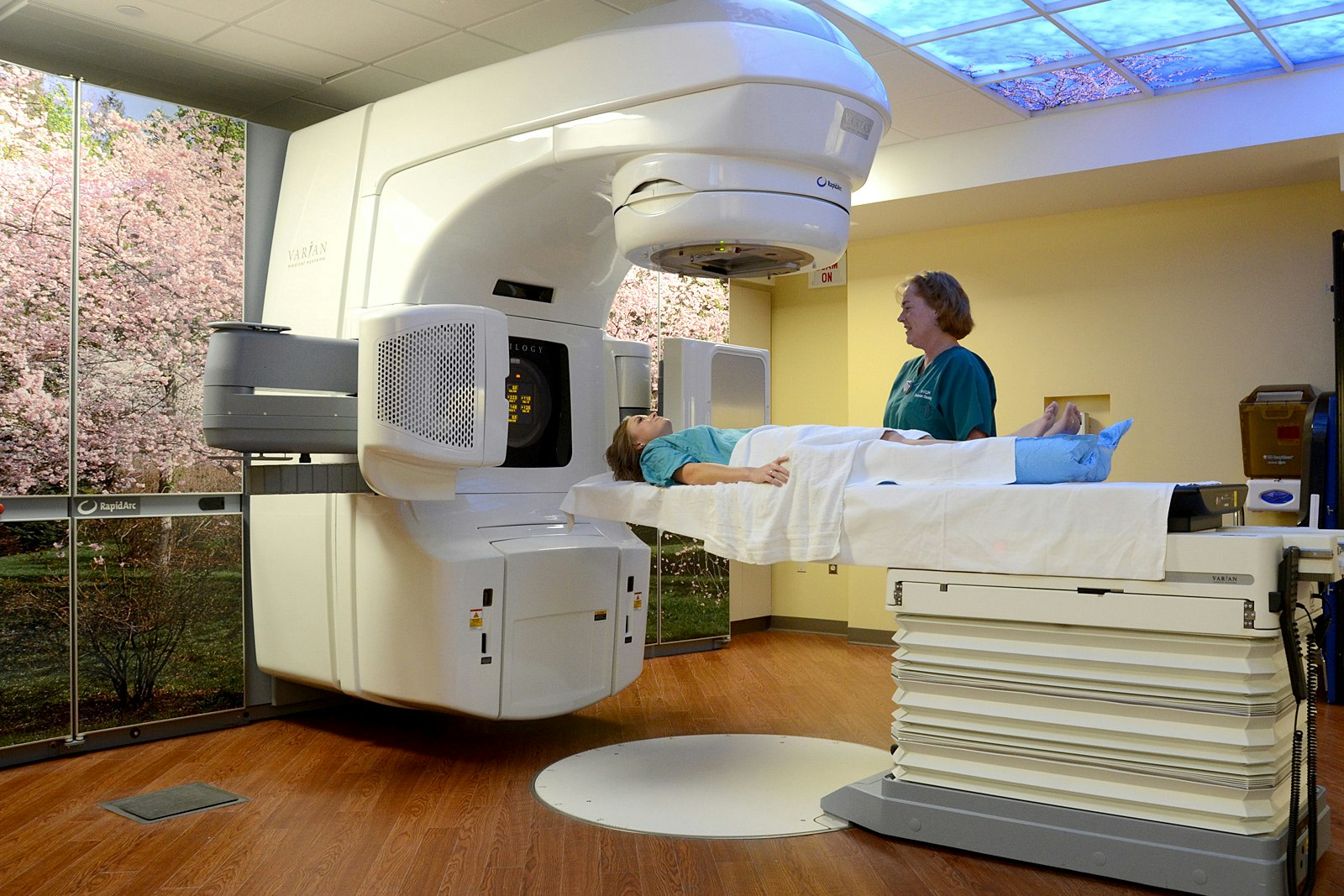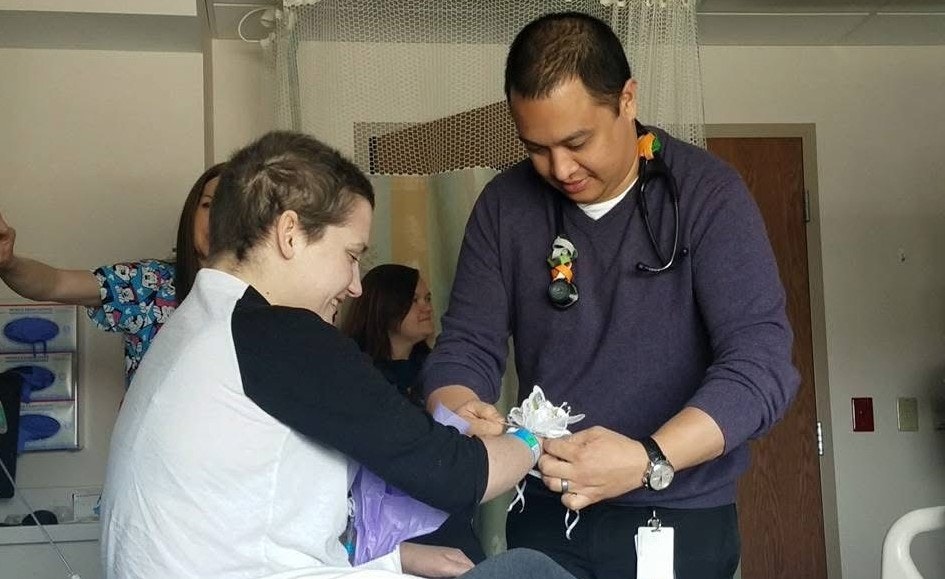The endocrine system comprises multiple glands — each makes hormones that travel throughout your body through the bloodstream. These hormones impact how your body works, including growth and metabolism, reproduction, and mood. When cells change and grow out of control, they can form a mass that is either benign (noncancerous) or cancerous. The majority of endocrine tumors are noncancerous and take years to develop, growing slowly.
Our endocrine specialists diagnose and treat diseases that affect the thyroid, parathyroid, pancreas, reproductive organs, pituitary and hypothalamic tumors, bones, and adrenal glands. At the WVU Cancer Institute, we bring together programs and expertise in all areas of medical and surgical care to offer you individualized, state-of-the-art care.
Types of Noncancerous and Cancerous Endocrine Tumors We Treat
Endocrine tumors develop in both men and women. They are found in hormone-producing cells within the thyroid, adrenal gland, parathyroid gland, pancreas, and pituitary gland. Because hormones are responsible for keeping the body balanced, they have the potential to cause problems. It’s important to keep in mind that most endocrine tumors are benign.
Hypothalamic tumors
The cause of endocrine tumors of the hypothalamus is generally unknown. It is most likely that both environmental and genetic factors play a role in the development of these tumors. These tumors can be benign or malignant. Most hypothalamic endocrine tumors found in children are gliomas. Generally, in adults they often arise from cancer that has spread from other organs.
Thyroid gland tumors
The majority of thyroid nodules are noncancerous. These include multinodular goiter (enlarged thyroid caused by multiple nodules), thyroid cysts (fluid-filled space), and toxic nodules that cause the thyroid to become overactive. There are four different types of thyroid cancer, including papillary, follicular, medullary, and anaplastic. Thyroid cancer found at an early stage can be treated successfully.
Parathyroid gland tumors
Almost all parathyroid tumors are benign (noncancerous). Parathyroid cancers are very rare. A parathyroid tumor starts in one of the four glands in your neck or upper chest near the thyroid gland. The parathyroid gland is responsible for controlling the levels of calcium and phosphorus in your blood.
Pituitary tumors
The pituitary gland produces hormones that affect fertility and growth. Additionally, it can produce hormones which affect metabolism (thyroid stimulating hormone) and stress, sugar, and blood pressure regulation (ACTH). Approximately 99 percent of pituitary tumors are benign (noncancerous) and are slow-growing adenomas.
Adrenal gland tumors
This gland produces hormones that regulate metabolism, blood pressure, and adrenaline. These tumors are very rare. However, certain genetic conditions can increase the risk of adrenocortical cancer.
Pancreatic cancer
This type of cancer can develop in the exocrine cells and the neuroendocrine cells, such as islet cells. The pancreas makes important hormones, including insulin that controls blood sugar levels.
Diagnosing Endocrine Tumors
There are different ways to diagnose endocrine tumors. It is important to speak with your doctor if you notice any unusual symptoms such as rapid weight gain, significant changes in your blood pressure or heart rate, a lump on the front of your neck, increased thirst, or increased urinary frequency. If you are male, watch for any female traits that start to form, such as changes in your breast size. If you are female, watch for any signs or changes associated with male characteristics, such as increased facial hair.
If your doctor suspects you may have cancer, certain tests can explain what is going on in your body. Because noncancerous conditions may cause abnormal test results, we carefully examine your results and consider all factors.
Thyroid cancers are routinely diagnosed using non-invasive and minimally invasive procedures including thyroid ultrasound and fine-needle aspiration biopsy.
Other tests we use to diagnose endocrine tumors include:
- Advanced imaging — Doctors use ultrasound, computed tomography (CT), magnetic resonance imaging (MRI), and positron emission tomography (PET) scans to detect signs of disease and see whether cancer has spread to other areas of the body, such as the lymph nodes or lungs.
- Biopsy — Doctors use this test to examine tissue under a microscope to determine whether cancer is present. During a biopsy, a doctor removes a small sample of tissue at the tumor site to analyze in a lab. Biopsy results help oncologists plan the best treatment for you. There are several different biopsy types, including image-guided biopsy, fine-needle aspiration biopsy, core needle biopsy, excisional biopsy, and endoscopic biopsy.
- Blood protein testing — Doctors use this test to look at different proteins in your blood to see whether abnormal proteins are present.
- Blood tests — Doctors use a blood test called a complete blood count to measure the number of different types of blood cells in your body. Doctors can detect blood cancers using this test. Doctors also use cytogenetic analysis — a blood test that looks at fluid, tissue, hormone excess/deficiencies, and cells to see if any chromosome changes might be caused by cancer. Other blood tests doctors may perform to detect cancer include flow cytometry and immunophenotyping.
- Physical exam — Doctors use a physical exam to look for signs of something going on in your body, such as the presence of a tumor. These can include skin color changes, enlargement of an organ, or lumps in your lymph nodes.
Treatment for Endocrine Tumors
From your first visit, our team works with you to address your specific condition and needs.
Your care plan may include:
- Endocrine surgery — Surgery, such as minimally invasive parathyroid surgery, can help us diagnose, stage, and treat many tumors. We also use it to relieve symptoms caused by tumors that press on a nerve or bone. If you have a high risk of developing cancer, we may recommend surgery to remove tissue or organs before cancer develops. We also offer the latest in reconstructive surgery to help recreate the part of your body affected by cancer.
- Infusion therapy — Our doctors give medicine and fluids through a catheter into your bloodstream. Medicines may include antibiotics, chemotherapy, and fluids to build nutrients.
- Medical oncology — Medical oncology includes chemotherapy, immunotherapy, targeted therapy, and hormone therapy. Our doctors use the latest in anti-cancer medicine to destroy cancer cells, slow cancer growth, and shrink tumors before surgery. Sometimes, we use medication alongside other treatments, such as radiation, or after surgery to destroy any cancer cells that might remain.
- Radiation oncology — We use radiotherapy treatments to target, destroy, and shrink many types of cancers. The treatments use a linear accelerator to produce precise, high-energy rays that target the exact area of cancer and spare healthy cells. Radiation oncology includes 3D conformal radiotherapy, image-guided radiation therapy, and intensity-modulated radiation therapy. We also use radioactive iodine therapy in patients with thyroid disease.
- Stereotactic radiotherapy — This type of treatment is often used for pituitary cancer treatment. It is a precise form of radiation therapy that uses several beams of different intensities to target a tumor from different angles.
Resources for Endocrine Cancer
We believe cancer care goes beyond medical diagnosis and treatment. We encourage you to access resources that may help answer questions and connect you to others, including:





